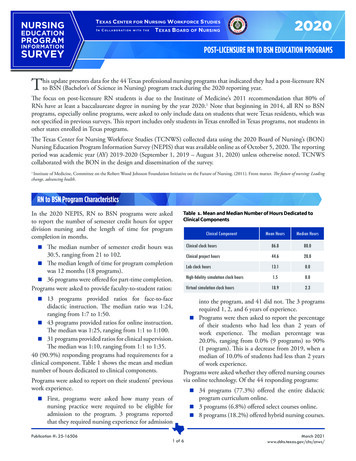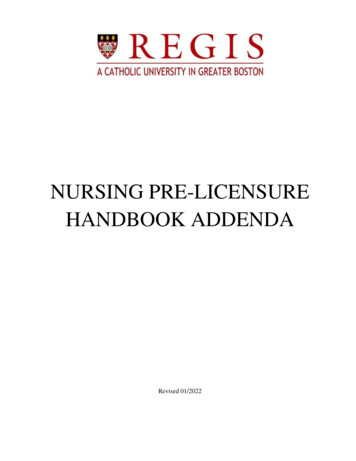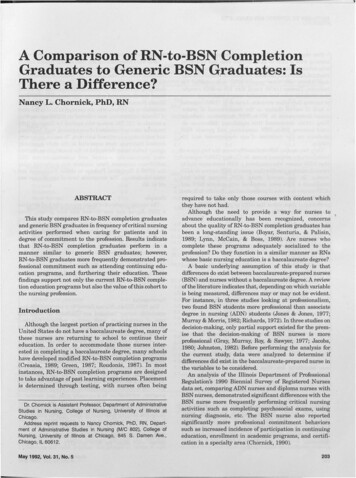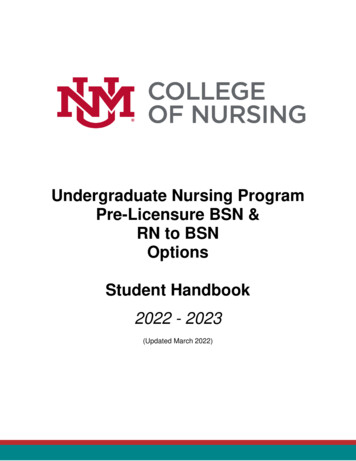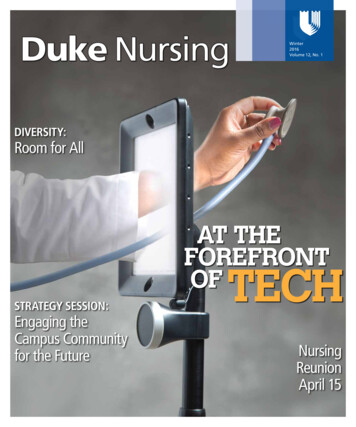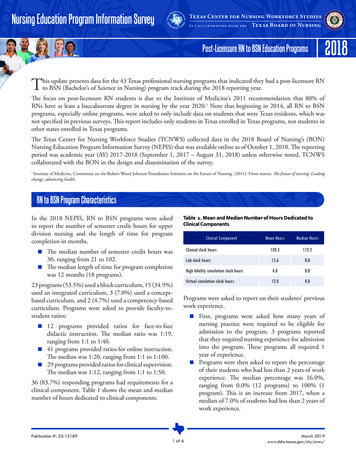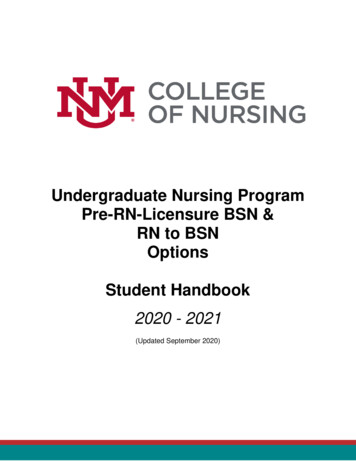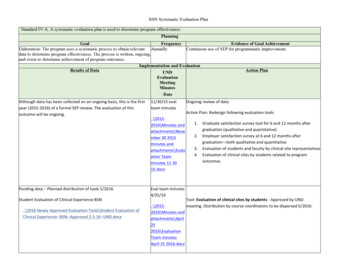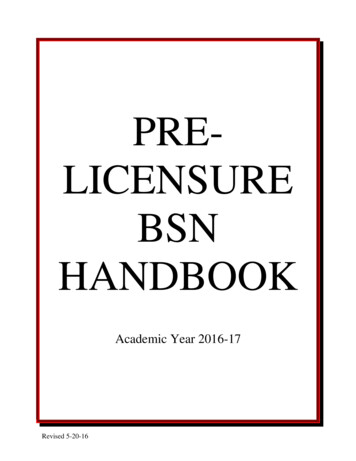
Transcription
PRELICENSUREBSNHANDBOOKAcademic Year 2016-17Revised 5-20-16
TABLE OF CONTENTSPageUniversity Resources1Department of Nursing Contacts2Department of Nursing Mission Statement3Student Learning Outcomes4Academic Regulations5 Class AttendanceAcademic IntegrityEvaluation Methods555GENERAL UNIVERSITY INFORMATIONAcademic Advising6Academic Portfolio6Computer Literacy and Access6Experiential Learning7Persons with Disabilities7Professional Liability Insurance7Professional Standards of Conduct8Program Completion Requirements8Steelman Library8Transportation to Experiential Learning and Other Community Sites8Writing Policy9Student Life Expectations10 Student Involvement in the Nursing DepartmentDrug-Free CampusTransfer of Credit101010Revised 3-21-16 MPi
GENERAL INFORMATION FORPRE-LICENSURE BSN PROGRAMPageAcademic Advising11Experiential Learning11Grades and Attendance11Community Service Hours11Student Involvement in the Nursing Department12Professional Standards of Conduct13 Uniforms and Appearance AttendancePre-Licensure BSN Curriculum Requirements131415-16Pre-Licensure BSN Grading Requirements17Pre-Licensure BSN Application and Admission to Professional Phase18 Evaluation MethodsAdmission/Registration Dates1818-19Following Acceptance:Certifiedbackground.comScreening and Tracking Criminal Background Inquiry Urine Drug Screen FDLE Fingerprinting Immunizations Yearly Flu Shots BLS/AED Card Professional Liability Insurance191919191919191919Pre-Licensure BSN Course Requirements Freshman Year Sophomore Year Junior Year Senior Year20-2320212223Receipt for Copy of Handbook24ii
SOUTHEASTERN UNIVERSITYDEPARTMENT OF NURSINGCOLLEGE OF NATURAL AND HEALTH SCIENCESHANDBOOKUNIVERSITY RESOURCESAddress: 1000 Longfellow Blvd., Lakeland, FL 33801Telephone: (863) 667-5000Fax: (863) 667-5200SEU Website: http://www.seu.edu/SEU Student Handbook: http://myseu.seu.eduSEU Academic Catalog: SEU Website Academics CatalogKent Ingle, DMinPresident of the College(863) 667-5002kingle@seu.eduDeborah Hazelbaker, PhDDean, College of Natural and Health Sciences(863) 667-5112djhazelb@seu.eduWilliam Hackett, DMinProvost(863) 667-5004wchacket@seu.eduKathy KempaMedical Librarian(863) 667-5062kfkempa@seu.eduAndrew Permenter, DMinAssociate Provost(863) 667-5993ahpermenter@seu.eduLinda KelsoRegistrar(863) 667-5011lmkelso@seu.eduRevised 3-21-16 MP1
DEPARTMENT OF NURSINGMarcia Miller Posey, EdD, MSN, ARNP, FNP-BCDepartment Chair/Director of Nursing(863) 667-5252maposey@seu.eduLucy Baccus Stella, DHSc, MN, MS, RNSimulation Manager/Associate Professor(863) 667-5262lbstella@seu.eduKimberly Acevedo, MSN, ARNP, ANP-BCClinical Coordinator/Assistant Professor of Nursing(863) 667-5317klacevedo@seu.eduMichelle Williams, PhD(c), MSN, RNATI Coordinator/Associate Professor of Nursing(863) 667-5370mlwilliams@seu.eduConnie Fleming, MSN, ARNP-CAssistant Professor of Nursing(863) 667-5371ckfleming@seu.eduNew Faculty 2016-17Susan Tasker-Weaver, EdD, APRN, PMH-BCAssociate Professor of NursingPhone: TBAEmail: TBATeresa Ousley, MSN, RNAssistant Professor of NursingPhone: TBAEmail: TBAJeanna Kerchner, BSN, RNClinical FacultyPhone: TBAjlkerchenr@seu.eduSandra SheffieldAdministrative Assistant(863) 667-5264sesheffield@seu.edu2
DEPARTMENT OF NURSINGMISSION STATEMENT AND VISIONThe mission statement of the Nursing Program, written in concert with the mission statement ofSoutheastern University, is as follows:Equipping students to serve Christ and the world as competent professional nurses through Spiritempowered ethical practice informed by critical thinking, life-long learning, and leadership.The vision of the Nursing Program, also developed to reflect the vision of the University, is describedbelow:The Southeastern University Nursing Program will offer a professional education program that preparesstudents to provide excellent nursing care to individuals, families, and communities through theintegration of faith, learning, and service.Faculty will provide a Christ-centered, student–focused learning community that encourages students togrow in their role as professional nurses.Students will gain an educational foundation that allows them to provide safe, evidence-based andculturally competent care for all patients, with special emphasis on the underserved. They will useclinical judgment to integrate evolving technology and research findings into caring interventions thatimprove patients’ health and support the sick and dying, their families and communities.Students will commit to life-long learning, rigorous scholarship, leadership and collaborativeinterprofessional practice as a means of serving their communities.3
BACHELOR OF SCIENCE IN NURSINGStudent Learning Outcomes (SLOs)Upon graduation, students completing Southeastern’s Nursing Program will be able to:1. Use liberal studies concepts, effective oral and written communication and Christian values toinform nursing practice, education and scholarship.2. Integrate basic organizational and system leadership skills to develop, implement, and evaluatesafe and effective nursing care for individuals, groups, populations, and communities.3. Apply the nursing process to provide safe and effective nursing care, consistent with currentscientific evidence and appropriate clinical judgment to individuals, groups, populations, andcommunities.4. Integrate clinical prevention, patient safety and principles of continuous quality improvement intonursing care of individuals, groups, populations, and communities.5. Implement strategies to reduce barriers and facilitate successful transition of patients throughvarious levels of care.6. Demonstrate beginning competence in information management and the use of patient caretechnology to insure safe and effective nursing care for individuals, groups and communities.7. Integrate therapeutic communication in formal and informal interaction with patients, families,groups, and colleagues as part of the delivery of nursing care.8. Integrate the roles of provider of care; designer/manager/coordinator of care; and member of theprofession into individual practice.9. Demonstrate beginning competence in interprofessional communication and collaboration toimprove patient outcomes.10. Integrate ethical and legal principles, including health care regulation and professional nursingvalues and standards, into one’s nursing practice.11. Actively pursue life-long learning to enhance one’s development as a professional nurse.12. Contribute to the development, utilization, and/or evaluation of health care policy, consideringthe human and financial consequences of the policy.These Student Learning Outcomes are consistent with the American Association of Colleges ofNursing (AACN) Essentials of Baccalaureate Education (2008) and directed the development ofthe course of study for both the RN to BSN Program and the Pre-licensure BSN Program.4
ACADEMIC REGULATIONSClass AttendanceStudents are expected to attend all class sessions on time and may be absent only for unavoidabledocumented reasons. It is the student’s responsibility to inform the professor of any anticipated absencesand to make up any missed work. A student may be withdrawn from a class at the discretion of theprofessor. Reasons for withdrawal may include, but are not limited to, lack of attendance or inappropriateclassroom behavior.Please refer to the SEU Student Handbook for detailed policies and procedures regarding withdrawalfrom a class, academic performance requirements, incompletes, and academic grievance procedures.Academic IntegrityAcademic integrity is assumed and expected of all students taking courses at Southeastern University.Plagiarism – the use of someone else’s words or ideas without giving that person credit – is dishonest andhas serious consequences. The consequences of plagiarism are discussed in the SEU Student Handbook.Evaluation MethodsNursing Department Grading ScaleA A- B B B- C C C- D D D- F 660-630-59A grade of 80% or higher is required to pass all undergraduate (BSN) nursing courses.5
GENERAL UNIVERSITY INFORMATIONAcademic AdvisingFaculty members and the Registrar are available to discuss curricular matters, class schedules, graduationrequirements, etc. as the need arises. Each nursing student will be assigned a Nursing faculty member asan academic advisor upon admission.Academic PortfolioThe teaching-learning philosophy of the Nursing Department emphasizes self-directed learning, selfevaluation and reflective practice. Toward this end, all students are required to maintain an academicportfolio. The portfolio is a collection of selected required assignments completed throughout the NursingProgram. An individual student may choose to include material from non-nursing courses, but this is notrequired. One clean, ungraded copy of required assignments should be saved in the portfolio. Eachstudent will be asked to perform a review and self-assessment of learning upon completion of the NursingProgram. Additionally, faculty members may periodically request the student to submit the portfolio inentirety for use in program outcome assessment or for outside review by accreditors.The portfolio will be kept in electronic format. The student is responsible for maintaining his or herportfolio and may be asked to provide it for use in program outcome evaluation. Students may choose tohave a hard copy of their portfolio. This is also a useful tool for the student to use in a job interview todemonstrate their accomplishments.Computer Literacy & AccessTechnical requirements for using MyFIRE:Computer capable of using required software listed below.1. Microsoft Office 2010 (Word, Excel, PowerPoint) or Microsoft Office 2008 for Mac(Word, Excel, PowerPoint). *2. High speed internet connection (DSL, Cable or FIOS connection).3. Latest version of Mozilla FireFox **4. Latest version of Adobe Acrobat Reader **5. Latest version of Adobe Flash Player **6. Latest version of Java**7. Latest version of QuickTime**8. Latest version of Windows Media Player**9. Current version of virus and spyware software6
* Previous versions of Microsoft Office may be used with the installation of a compatibilitypack, but such a configuration is not recommended.** Southeastern University does not control and is not responsible for the contents of this linked site orany link contained within this linked site. The inclusion of this link(s) does not imply SoutheasternUniversity endorsement, either directly or indirectly, of the site, entity, product(s), or service(s).Experiential LearningSome of the nursing courses have experiential learning integrated into the course. For didactic coursesthat have experiential learning, two experiential learning hours will be equivalent to one classroom hour.For courses that incorporate undergraduate clinical experiences, the student will engage in three hours ofclinical experience for every one credit hour.Students with DisabilitiesSoutheastern University is committed to the provision of reasonable accommodations for allstudents with learning and/or physical disabilities, as defined in Section 504 of theRehabilitation Act of 1973 and with the American with Disabilities Act (ADA) of 1990.This legislation guarantees educational rights for the physically and learning disabled.Students with medical diagnoses which qualify them for accommodations must contact ADAServices at 863-667-5283 or email ADAservices@seu.edu. Once medical documentationis provided and a confidential consultation is completed, the student will then beresponsible to provide the Director of Academic & Auxiliary Services with a list of his orher current professors and their emails.Contact with the Office of Academic & Auxiliary Services is mandatory for each new semester.For more information, visit the SEU Students with Disabilities page on our website.Professional Liability InsuranceA blanket student liability insurance policy will cover all nursing students. The policy is designed toprotect SEU in the event of an adverse event. Additionally, nursing students are encouraged to carry theirown professional liability insurance. This policy is for the student’s protection if an adverse event occurs.The student will be billed a fee of approximately 15.00 - 20.00 (price subject to change) annually whileenrolled in a nursing program.This policy ONLY covers the student when acting as an agent of the University regardless of theclinical site. If the student is conducting an assignment in their own workplace, they will be coveredas long as they are not performing any functions of their regular role with pay.7
Student Standards of ConductStudents in the health professions are held to standards of conduct that both differ and exceed thoseusually expected of college students. Nursing students are required to demonstrate clinical competency inthe care of patients, adhere to the standards in the Florida Nurse Practice Act, and to follow the tenets ofthe American Nurses Association Code of Ethics for Nurses. Civility is expected at all times when thestudent interacts with peers, faculty, patients, visitors and staff.Grievance procedure is as follows: Student must follow the policy for filing grievance according to theAcademic Catalog.Failure to follow the guidelines listed under the Professional Standards of Conduct may result indisciplinary action that could result in a verbal warning, probation, suspension or expulsion from theNursing Program at Southeastern University. If the disciplinary action results in dismissal from a clinicalexperience, it will count as an absence.Program Completion RequirementsStudents enrolled in any Nursing Program are required to complete the program within seven (7) years ofadmission.Steelman LibraryLibrary resources can be accessed at Steelman Library or through Inter Library Loan. Library resourcesinclude journals, books, videos and CD-ROMs. Search databases are available through the SteelmanLibrary website. Several of the databases contain full text articles. Students must obtain a password inorder to access these databases. Passwords may be obtained from the Steelman Library.Transportation to Experiential Learning and Other Community SitesStudents will be participating in an array of community activities throughout the curriculum.Transportation to these activities is the responsibility of the student. Some agencies will offer studentsaccess to rides from the agency personnel who are working with the students, for example, to home visits.This is a policy decision of the agency. Students are not required to ride with agency personnel nor areagency personnel required to provide transportation. Regardless of whether a student drives his/her ownvehicle or rides with someone else, the driver of the vehicle and his/her insurance would be responsiblefor coverage of liability expenses. The University does not cover travel liability for home visits or visitsto community sites. Students are expected to follow all traffic and parking rules.8
Writing PolicyMost, if not all courses in the Department of Nursing—College of Natural and Health Sciences will havea substantial writing requirement in accordance with our goal of writing competency. The AmericanPsychological Association (APA) Manual for writing is the style guide used by the Department ofNursing and is required for preparation of all formal written papers. Students are expected to purchaseand use a current edition of the APA Manual. Additionally, a copy is available in Steelman Library.Papers are expected to reflect basic grammatical correctness and appropriate organization. Professors mayask that work with multiple grammatical or organizational errors be rewritten and resubmitted. Moreover,a professor may deem the re-written assignment to be late and grade accordingly.9
STUDENT LIFE EXPECTATIONSSoutheastern University strives for excellence inside and outside of the classroom. All studentsare expected to follow all University regulations; to follow all local, state, and federal laws; to behonest in all situations, academic and nonacademic; to respect the rights and property of others;to live in a manner that brings excellence to the student and to Southeastern University; to takeadvantage of every opportunity to expand one’s mind and to contribute positively to theUniversity’s environment.Student Involvement in the Nursing DepartmentNursing students are encouraged to participate in the functions of the Nursing Department. One studentfrom each program (Pre-licensure BSN, RN to BSN) will be nominated by nursing faculty membersannually to serve as representatives to provide input into curriculum decisions for both of theundergraduate programs. Please contact the Nursing Department for the names of the representatives or tonominate someone. Curriculum meeting minutes will be posted regularly on the Nursing CommunicationGroup forum.Drug-Free CampusThe University makes every effort to provide and maintain a drug-free campus. Pursuant to the Drug-FreeSchools and Communities Act Amendments of 1989, it is unlawful to manufacture, distribute, dispense,possess, use, or sell illicit drugs and alcohol in all buildings, property, facilities, service areas, and satellitecenters of the university. All students are required to comply with this policy as a condition of theircontinued enrollment. The possession, use, or distribution of alcohol, narcotics, or other intoxicants isprohibited for on and off-campus students.Southeastern does not permit students to provide alcohol to minors and/or possess or consume alcoholwhile under the legal age. Use of tobacco products such as cigarettes, cigars, snuff, smokeless tobacco,chew, hemp, hookah, etc. on or off campus is not permitted.Transfer of CreditTransfer credits will be considered according to SEU policies and reviewed on an individual basis. Forfurther information, please refer to the SEU academic catalog at Transfer of Credit from OtherInstitutions.10
GENERAL INFORMATIONPRE-LICENSURE BSN PROGRAMThe Pre-licensure BSN program is designed for students who hold no professional nursing degree orlicense and who want to become a professional nurse.The number of students admitted to the professional phase of coursework is limited by the Florida StateBoard of Nursing.Once admitted to the professional phase of coursework, Pre-licensure BSN students must follow aspecified sequence of courses. Refer to the SEU Academic Catalog for complete information aboutNursing Program admission and progress requirements.Academic AdvisingStudents are required to meet with the assigned academic advisor each semester.Experiential LearningStudents will be registered for companion simulation lab and clinical sections for designated courses. Thesimulation lab and clinical schedule will be assigned and students are expected to arrive promptly andprepared.The student is expected to behave professionally and with integrity at all times and to follow all safetyrules. Any student who is unprepared or disruptive may be asked to leave and will suffer theconsequences of missed time.Grades and AttendanceStudents must maintain a grade of 80% or higher in all nursing courses to progress.Students who miss a clinical day or Nursing Simulation Lab day will be required to make up the day perpolicy. Only one clinical day may be missed per course. See Professional Standards of Conduct.Community ServiceCommunity Service Hours (College Requirement): 60 hours with 30 of those hours related toHealthcare. Credit will be given for hours earned in high school if appropriate documentation is received.11
Student Involvement in the Nursing DepartmentOne student organization is recognized by the SEU Student Body Leadership Council (SBLC).The SEU chapter of the Florida Nursing Student Organization (FNSA) is open to all non-licensedstudents who are interested in becoming a registered nurse. This includes “pre-nursing” students who areseeking a nursing major but not yet accepted into the professional phase of the program. ExecutiveOfficers of FNSA must be currently enrolled in the professional phase of the BSN program. FNSA bylaws are posted on the Nursing Communication Group forum. Students must join a professionalorganization for their final year of the nursing program to promote professional knowledge andleadership.12
PROFESSIONAL STANDARDS OF CONDUCTProfessional Dress Code during ClinicalsStudents are required to present to their clinical assignment, whether in a hospitals or clinic, inprofessional attire. They will be traveling throughout the area and are the frontline example ofSoutheastern University Nursing Department and it is very important that they present a positivereflection.Pre-licensure nursing students are required to wear a designated nursing student uniform. The designatedSEU nursing student uniform and lab coat must be ordered from school store. Students are responsible forthe cost of personal uniforms and other required personal supplies and equipment as part of their studentexpenses.Uniforms must be clean, ironed, and worn so that the elastic/drawstring of the pants is at the waist. Thepants should not be dragging the ground. The top should cover the hips, and no midriff should be seen.Uniform shoes must be closed toed and heal, black or white and made of leather. Shoes and laces must beclean. No canvas shoes or clogs are permitted. White or black socks must be worn.Student must have a visible SEU identification badge on at all times during clinicals. If the clinicalfacility requires students to obtain one of their badges, it must be present and visible at all times on theuniform or lab coat.Hair must be restrained away from the face and up off the shoulder. No hair covering or hairornamentation, larger than a quarter, will be allowed without prior approval from the professor. Hair mustbe of natural color. Mustaches, sideburns and/or beards must be trimmed. Please note that some facilitiesrequire clean shaven (no facial hair). If that should be the case policy must be followed. Male studentsmay not have hair that does not extend below the earlobe. No “man buns” will be allowed.Jewelry worn in the clinical area is limited to a watch with a second hand, wedding ring, and small post ofone pair of earrings in ears. Wrist bracelets and neck chains are not permitted. No visible piercings,including tongue rings.Perfumes or heavy make-up is not permitted.Nails must be kept short and filed with clear or neutral nail polish. No artificial nails or extensions may beworn.Tattoos must be covered at all times. A black, white or red undergarment, such as a t-shirt, may berequired to cover body art that extend down the arms.If a student is not dressed appropriately for the clinical setting, they may be sent home at the clinicalinstructor’s discretion and that will count as an absence.When entering a clinical site where the student will not have direct patient contact, business attire and thedesignated lab coat with student name tag must be worn. Shoes must be neat and clean. No open toed13
shoes or heels higher than one inch.For community settings, the student will wear the designated community shirt, name tag, socks andapproved shoes (as noted above). Students who do not come in designated uniform are subject to beingsent home. In that event, it will count as a missed clinical day.If a healthcare agency determines that student conduct is not in accordance with acceptable standards ofperformance, they have the right to request that the student be withdrawn from the agency. It will bedetermined by the agency, Clinical Coordinator and Director/Chair of the Department of Nursing if thestudent is allowed to return.SIMULATION LABThis is considered to be part of the clinical experience so you are required to dress as if you are attendinga clinical site. Please see information above for detailed explanation of uniform requirements.AttendanceStudents are expected to attend all clinical days. Only one clinical day can be missed per course forextenuating circumstances. However, it must be made up. One clinical make-up day is allotted forthose circumstances.If a student misses more than one clinical day, he/she will be dropped from the course. Should thisoccur, the student will be required to request re-entry when the course is offered the next time.Upon re-entry into the program, an individual plan of clinical remediation will be developed to helpthe student prepare for patient care. (Extenuating circumstances will be considered on anindividual basis).If a student is going to be absent, he/she must notify the clinical site to which he/she is assigned and theclinical instructor at least two hours in advance. Leaving a message on the instructor’s home or campusphone does not substitute for calling the facility where you are assigned for clinical. In other words, thestudent must notify both the clinical site and the clinical instructor.The student is responsible to contact the Clinical Coordinator the first day that the student returns tocampus after a clinical absence. They will then be assigned to a mandatory clinical make-up day. Failureto do so will result in a failure for the course.If a student becomes aware of the need for a clinical absence prior to the actual day of the clinical, theywill contact the Clinical Instructor and Clinical Coordinator to complete arrangements for the make-upclinical.If a student is delayed, he/she must call the clinical site where he/she is assigned and the clinicalinstructor at least 1 hour in advance. Failure to do so may result in the student being asked to leave theclinical site and it will count as an absence.Students must arrive on time for clinicals. Tardiness of more than 10 minutes may be grounds for beingsent home and the day will be counted as an absence. If the student arrives after the conclusion of the preconference session, the Clinical Instructor will determine if the student will be sent home and receive anabsence for the day or be permitted to stay due to the circumstances for the tardiness.Additionally, the Nursing Simulation Lab is part of the clinical experience. Therefore, if the student14
misses a Simulation Lab Day, he/she must schedule make-up time with the Nursing Simulation LabManager.PRE-LICENSURE BSNCURRICULUM REQUIREMENTSThe Pre-licensure BSN curriculum prepares students for professional nursing practice as a RegisteredNurse (R.N.).Pre-licensure nursing students complete all educational competencies and clinical proficiencies under thesupervision of qualified nursing professors and are prepared to successfully pass the National CouncilLicensure Examination (NCLEX-RN).Graduates must meet all legal requirements for licensure established by the State Board of Nursing inorder to be eligible to take the NCLEX-RN for licensure as a Registered Nurse.A dosage calculation exam is administered in Foundations of Nursing. The student must score100% on the dosage calculation exam in order to progress in the program. The student will havethree opportunities to pass the exam. Following a second failed attempt, the student may requestremediation and a third and final opportunity to achieve a 100% score on the exam will be granted. Thefinal attempt must be completed not more than 7 days after the second effort. A student who fails toachieve the required 100% score on the dosage calculation exam will be withdrawn from thenursing program and may apply for re-entry the following academic year. The student may petitionthe Director/Chair of the Department of Nursing to re-enter the program in a later semester. If the petitionis denied, then the student may petition to the Dean of the College of Natural and Health Sciences.After the first semester of the Nursing Program, five (5) medication questions will be included on eachcourse exam throughout the program to ensure continued competency in the safe administration ofmedications. Students must correctly answer 4 out of the 5 questions on each exam. If they do not meetthat standard, they will be required to set up an appointment with the Nursing Simulation Manager forremediation and must successfully pass a medication exam with 100%. Failure to do so after threeattempts will result in the student being withdrawn from the program. The student may petition theDirector/Chair of the Department of Nursing to re-enter the program in a later semester. If the petition isdenied, then the student may petition to the Dean of the College of Natural and Health Sciences.Most courses in the Pre-licensure Nursing Program include a standardized final examination designed toprepare the student for success on the National Council Licensure Exam for Registered Nurse (NCLEXRN). To aid in this goal, standardized Content Mastery Modules are integral to various courses. Fees forthese modules are assessed as part of the course registration and will appear on the student’s SEUaccount.Non-Proctored Online Practice AssessmentPrior to sitting for the end of course exams, students are required to complete the non-proctored ATIPractice exams. A minimum achieved score of 90% on the designated non-proctored exam is required.Non-proctored exams may be taken as many times as needed to achieve the 90% minimum grade for15
proctored exam entrance. Students who do not meet this requirement will not be allowed to sit fordesignated course exam.Proctored Mastery ExamThe ATI proctored exam must be taken as scheduled prior to the final course exam. Students mustachieve a score on an ATI RN Content Mastery Assessment exam that equates to a Proficiency Level 2or higher. One test attempt is allowed.Students who achieve: Level Three will earn 10 points added to their Final Exam grade Level Two will earn 5 points added to their Final Exam gradeRemediation through ATI program must be completed for all areas scored below Level Two withdocumentation of complet
Pre-Licensure BSN Curriculum Requirements 15-16 Pre-Licensure BSN Grading Requirements 17 Pre-Licensure BSN Application and Admission to Professional Phase 18 Evaluation Methods 18 Admission/Registration Dates 18-19 Following Acceptance: Certifiedbackground.com 19 .
